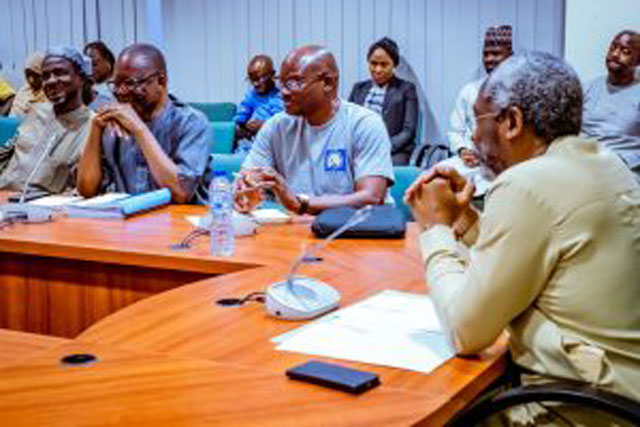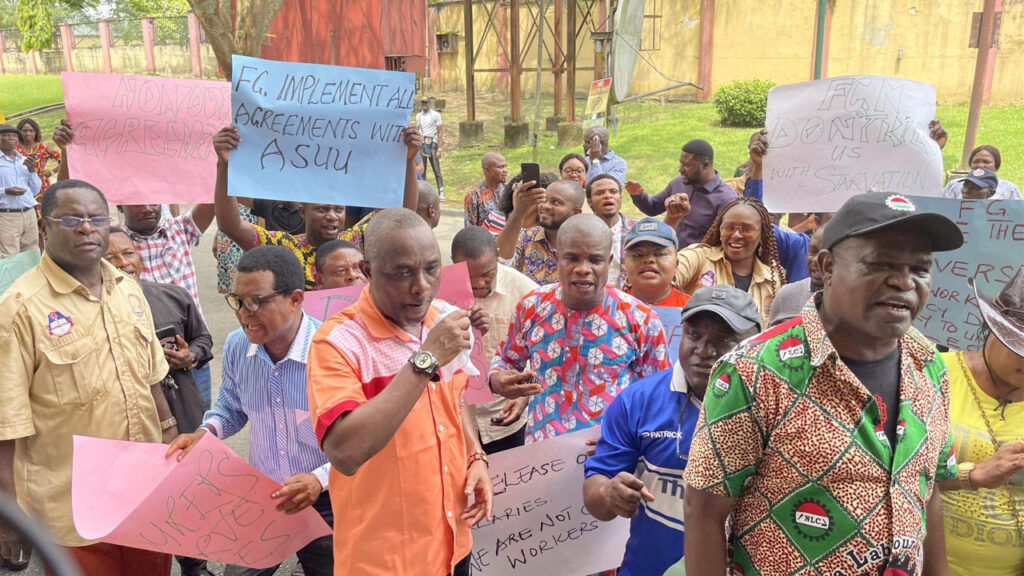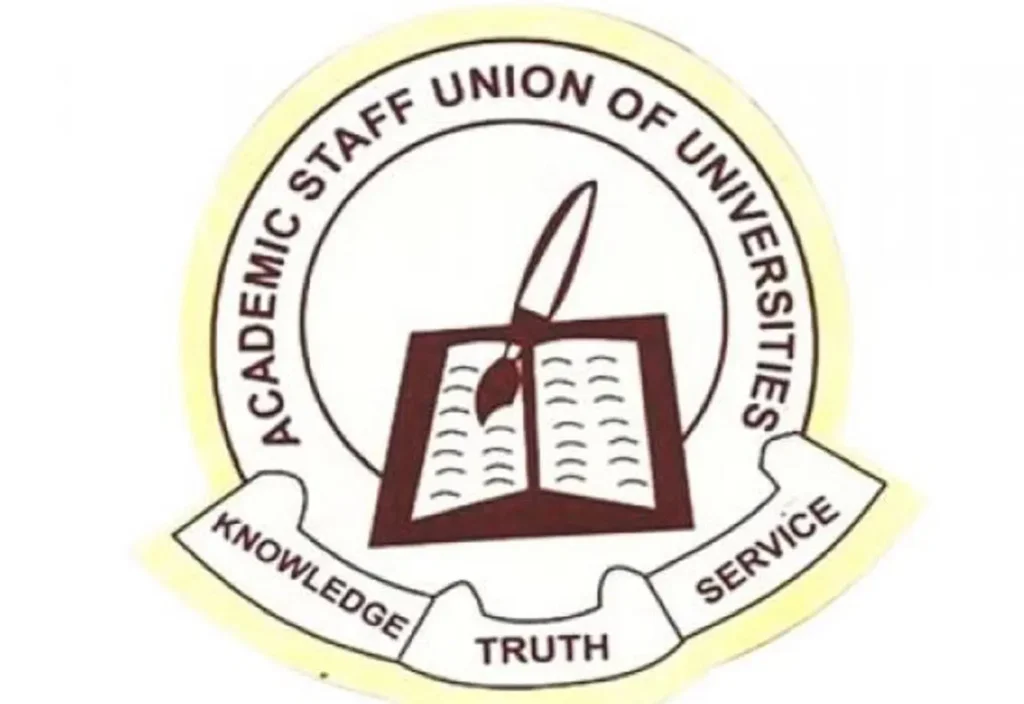Salaries remain at the heart of the latest standoff as the Academic Staff Union of Universities (ASUU) escalates its campaign for timely remuneration, enforcing its long-standing “no pay, no work” principle. Several branches have effectively halted lectures and other academic activities, responding to a disturbing pattern of delayed salary payments. This development marks a significant flashpoint in the ongoing tension between the union and the Federal Government, and one that threatens the continuity of academic schedules at major Nigerian universities.
Table of Contents
A Swift and Unified Response
ASUU President Professor Chris Piwuna recently reiterated the union’s position: any branch that has not received its June 2025 salaries by the third day of July must suspend all academic services. This is not a blanket strike, he clarified, but a targeted enforcement action aimed at institutions still awaiting payment.
Several prominent universities have already complied. Faculty at the University of Jos, Abubakar Tafawa Balewa University (ATBU) in Bauchi, and the University of Abuja have stepped away from classrooms and official duties, citing unpaid salaries. These actions are not symbolic—they reflect the union’s resolve to follow its National Executive Council (NEC) directives and compel government action.

Regional Ripples: Local Branch Reactions
University of Jos (UNIJOS)
Jurbe Molwus, chairman of the university’s ASUU branch, affirmed that members have disregarded lectures and meetings since July 3. The NEC’s rule is straightforward: no payment by the third day of the month triggers indefinite withdrawal until salaries are cleared.
Abubakar Tafawa Balewa University (ATBU)
In Bauchi State, ASUU members are adhering to the directive. Branch leader Dr Angulu Haruna criticised the Federal Government’s approach as deliberate, accusing it of favouritism toward other civil bodies when it comes to salary disbursement.
“Whenever we ask, they’ll always tell us that it is because of the migration from the IPPIS, and we see that there is preferential treatment against us in favour of other organisations.”
University of Abuja
Largely operating with a skeleton staff, the University of Abuja continues to feel the strain as most lecturers avoid campus until owed salaries are released.

The Friction with IPPIS and GIFMIS Systems
The root of the conflict lies in ASUU’s refusal to rejoin the Federal Government’s Integrated Payroll and Personnel Information System (IPPIS), which left over concerns about autonomy. Since migrating to the Government Integrated Financial Management Information System (GIFMIS), lecturers have reported chronic delays in salary payments.
President Piwuna has levelled pointed criticism at the Office of the Accountant-General, asserting that wage delays are intentional:
“The platform is working well, but those who make it work are not willing to make it work. We think it’s a deliberate act.”
Earned Academic Allowance: A Lingering Issue
The dispute extends beyond salaries. ASUU has consistently demanded the release of an estimated ₦10 billion still owed under its Earned Academic Allowance (EAA), incompletely paid despite a federal N50 billion disbursement in June. The union warns that failure to pay this balance could spark broader industrial action.
Why This Matters – The Stakes Are High
University Autonomy & Academic Calendar: With lectures suspended, students risk falling behind, especially as mid-term sessions approach. Many universities operate on rigid schedules; any delay affects graduation timelines and disrupts research output.
Erosion of Trust: The recurring reliance on “no pay, no work” highlights a deeper credibility crisis. ASUU views the delay as part of a longstanding pattern of financial mismanagement in the education sector. Repeated crises damage faith in the government’s ability to manage public higher education.
Pressure on the Federal Government: ASUU is strategically escalating pressure. While not an indefinite strike, the union’s current move raises red flags for more drastic action—including a full-scale strike—should July salaries remain unpaid.
A Delicate Diplomatic Dance
To prevent escalation, union-leaders are engaging government representatives at multiple levels: from the Education Ministry to the Accountant-General’s office. These discussions are critical and ongoing.
What Could Break the Impasse?
- Prompt June Salary Payments: Meeting the July 3 deadline would likely see branches resume normal operations.
- Settlement of EAA Arrears: Clearing the ₦10 billion backlog would remove a secondary flashpoint.
- Reevaluating Payroll Systems: Exploring hybrid or customized payment mechanisms might bridge ASUU’s autonomy concerns with the need for reliable government funding.
Experts Offer Insight
Education policy analysts advocate clearer communication channels between universities and government fiscal bodies. A transparent timeline for salary disbursement, and formal agreements on margin dates, could prevent future conflicts—before they spiral into prolonged disruptions.

In Conclusion: The Balance Between Bargaining and Breakdown
ASUU’s latest action—branches suspending lectures over unpaid salaries—is neither unprecedented nor unexpected. But it marks a sharpened phase in a struggle that touches on finances, institutional autonomy, and trust. With lecture halls empty and students in limbo, the urgency of resolution is unmistakable.
The union has provided a reasonable window: July 3 for June salaries and by month’s end for July payments. It now falls to the government to honour these deadlines—or confront a broader, more disruptive showdown.
Join Our Social Media Channels:
WhatsApp: NaijaEyes
Facebook: NaijaEyes
Twitter: NaijaEyes
Instagram: NaijaEyes
TikTok: NaijaEyes
READ THE LATEST EDUCATION NEWS








































